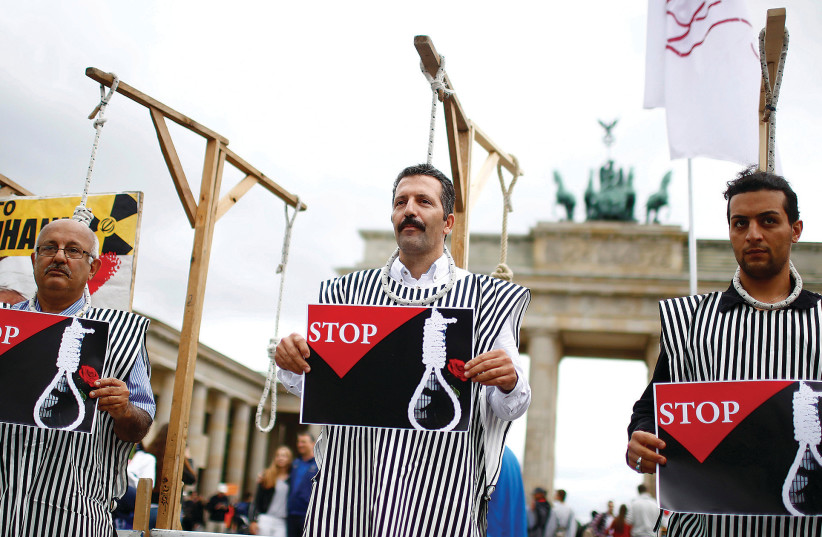Iran executed 582 people in 2022, according to a recent report by Iran Human Rights (IHR). This is a 75% rise since 2021, with the number of executions reaching a high not seen in seven years.
Of the executed population, 30% were from the Sunni Muslim Baluch minority, despite the group accounting for just 2-6% of the population, according to Barrons.
44% of the execution victims were arrested on drug-related charges, but many were arrested for protesting.
The report details that 88% of all executions included in the 2022 report, were not announced by authorities. The IHR report indicated that official information on executions has dramatically reduced in recent years. This means that there is a chance the actual figure for executions is higher.
The IHR report claims that of the people executed in 2022, three were juveniles and at least 16 were women.

Iran permits the death sentence of girls older than 8.7 years old and boys older than 14.6 years old.
What sparked the increased executions?
The Iranian authorities cracked down on protesters responding to the state’s murder of 22-year-old Mahsa Amini.
Amini had been arrested for violating Iran’s strict dress code laws for women.
"We fear the number of executions will dramatically increase in 2023 if the international community does not react more," IHR director Mahmood Amiry Moghaddam told AFP.
"Every execution in Iran is political, regardless of the charges," he added. He described the executed victims as on drug or murder charges as the “low-cost victims” of Iran's “killing machine.”
According to the World Coalition Against the Death Penalty (WCADP), since 2021, 5000 individuals have been sentenced to death and are awaiting their murder.
Moghaddam predicts that the number of executions will, again, increase in 2023. He claimed that Iran had already conducted 150 executions in the first quarter alone.
The IHR report also claims that Iranian laws “indirectly encourage arbitrary killings by private individuals. Experts believe, for instance, that Articles 301 and 302 might be contributing to the increased number of honor killings in Iran.”
Article 301 gives immunity to the father or paternal grandfather for killing a victim and Article 302 allows for anyone to kill someone who has broken a law that can be punishable by death.
However, the law does not apply to non-Muslims killing Muslims.
Those sentenced to death
WCADP shared a report detailing the story of Reyhaneh Jabbari. Jabbari stabbed a man who was trying to rape her and was then arrested and sentenced to death. She was held in prison for seven years before being hung at the age of 26. Her attempted-rapists' family was able to push for the sentence because she would not withdraw her accusation of the attempted rape.
According to article 302, Jabbari should have been given immunity for killing her attempted rapist.
Iman Safavi Rad was also sentenced to death on charges of "sodomy."
In response to the sentencing, Iranian Dissident Dr. Kazem Moussavi told the Jerusalem Post that "another man has been executed on a charge of sodomy, which he may or may not have committed, with or without consent. What is certain is that this man almost certainly did not receive a fair trial under the notoriously biased Iranian judicial system. Defendants are routinely denied access to lawyers and defense witnesses. They can be sentenced after brief 'trials' lasting as little as 20 minutes, with lawyers provided only shortly before the court hearing starts. People can be found guilty without corroborating evidence."
Another man has been executed on a charge of sodomy, which he may or may not have committed, with or without consent. What is certain is that this man almost certainly did not receive a fair trial under the notoriously biased Iranian judicial system. Defendants are routinely denied access to lawyers and defense witnesses. They can be sentenced after brief 'trials' lasting as little as 20 minutes, with lawyers provided only shortly before the court hearing starts. People can be found guilty without corroborating evidence."
Dr. Kazem Moussavi
According to the IHR report, sexual offenses like incest, rape, adultery, homosexual penetrative sex (lavat) and intercrural sex (a Muslim being a passive participant in sex with a non-Muslim) are all punishable by the state.
“A death sentence shall be imposed on the male party in cases of incest, fornication with their stepmother, fornication of a non-Muslim man with a Muslim woman and fornication by force or reluctance. The punishment for the female party shall be decided by other provisions concerning fornication,” according to Article 224 cited by IHR.
In 2022, 23 people were executed on rape charges, according to the IHR report.
Benjamin Wienthal contributed to this report.